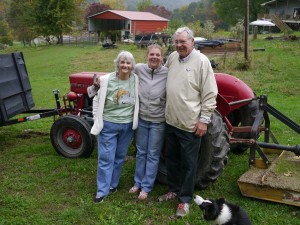Family In A Perfect World
Part 5, A North Carolina Holler
Appalachian “hollers” (hollows) are perfect little worlds, or used to be. They provided everything a large family needed: timber, firewood and game from the surrounding mountains, grazing on the descending slopes, farming in the fertile bottom lands, and even fish in the streams. And in almost every holler was a church and a cemetery next to it. The people were Baptists. They baptized in the water — total immersion. My grandfather and grandmother on my dad’s side were from the Appalachia’s of western North Carolina, near Mars Hill, which now is a picturesque little college town.
The college was started by the Southern Baptist Convention, but in recent years it has turned to other sources for funding. The region is diversifying. Many of the rural churches look abandoned. They are eclipsed by McMansions on the hills. In one of these land coves north of Asheville, half way between the Blue Ridge Mountains Parkway and the Appalachian Trail, we found Calloway Road.
I knocked on the door of a modular home, arousing a large dog inside. A pretty woman about the age of my daughters hushed the dog and came to the door holding a soft warm cookie with a bite gone. I told her my father’s people came from around there. She listened carefully. I smiled. Finally, she said, “I’m a Calloway. Would you like a pumpkin cookie?” She left and returned with two in a Ziplock bag. Pat and I ate them later. They were spicy with flecks of dark chocolate but not too sweet.
Amanda took us down the hill to meet her mother and father, Charles and Linda (same names as my parents), a greying couple who were at work in their farmyard. They were stacking boards for a communal barn raising set for that weekend. They had a pet mule, some goats, a few beef cattle, a young border collie and a garden. There were other acreages nearby, and Charles affirmed most of the neighbors were family. His grandfather, of the same generation as mine and perhaps from the same river drainage north of there, bought the cove about 100 years ago. He lived into his 90‘s and raised a self-reliant family.

Their way of life changed when paved highways came in. Asheville is now only about a half hour away by Interstate 26, and the people on Calloway Road are used to developers, dreaming of McMansions, knocking on their doors. An excellent building site for a commuter’s high house is on Charles and Linda’s property, but it is protected. It is the family cemetery. Linda took us there and talked about genealogy — how the names people give their children are a clue to ancestry. Some day, if I don’t run out of time, I will look for Charles’s and Josephs. The most intriguing name, however, was Louartie, a great-grandmother of mine. When I said this unique name, Charles laughed and mimicked a strange old lady’s diction. She lived in a cabin just down the road when he was a kid.
As we left, Linda had a humorous warning. If we stopped in any of the mountain towns we should not talk politics. “There are people who get angry, and they have guns.”
As a Westerner coming of age during the civil rights era I did not take any pride in what seemed to be my Southern Tar-heel roots. (I had seen Southern racism in the late 1950‘s in Arkansas when Orville Faubus was governor. ) At the Appomattox Court House National Park in Virginia, commemorating the end of the Civil War, we found a monument erected by the North Carolina legislature to 5,000 of its soldiers who were surrendered there and “who followed with unshakable fidelity the fortunes of the Confederacy.” But the more I learn about the mountain people of the South the more I am inclined to believe they are not your stereotypical Rebs. A history of the region of the French Broad River, which runs from Asheville to Knoxville, TN, tells how many folks in the mountains did not want to fight for the Confederacy. Some even fled north, just ahead of the Confederate conscription officers.
At the brand new (opened in March 2011) Museum of the Confederacy in Appomattox, VA, I mentioned this to a docent. He said the sympathies of the mountain people varied “from holler to holler.” I expressed my opinion that my own people “had nothing to do with slavery.” He agreed this probably was true, but the primary reason for their neutrality, where it existed, he suggested, was this: “The mountains were not invaded.”
It took a while for me to catch his meaning.

Mountains have a way of tilting war venues. Swamps muck em up too. Great series, Larry
“hollers”… reminds me of a line in a poem of mine:
“A hike, woods
Some nearly forgotten hollow a river nearby
Closer to my birth
Not really sure a memory? A dream?”
Although we are enjoying that colorful, subtly pungent, Indian Summer season back here in Crestone, your romantic description triggers a familiar longing for those forests of my youth.
Travel well my friend, appreciate your inviting us along for your ride!
Great to have you on the bus!